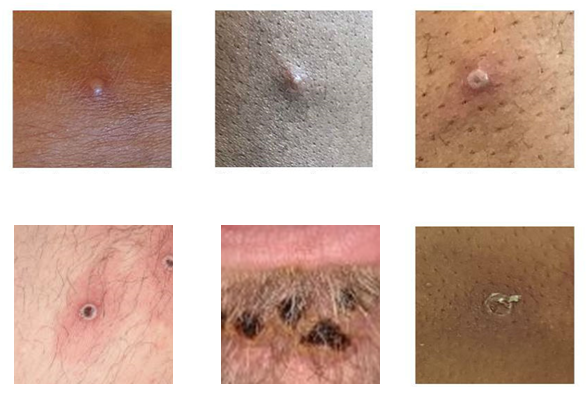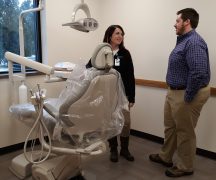By JAN LARSON McLAUGHLIN
BG Independent News
As of Thursday, 38 cases of monkeypox had been recorded in Ohio – with one of those cases being in Wood County.
Several weeks ago, a Wood County resident was confirmed to have monkeypox, according to the Wood County Health Department, which released information on the case Friday afternoon. That person was reportedly exposed outside of Ohio and had no social interactions in the county during the period when the individual was contagious.
According to the health department, the case did not pose a risk to the general public. A few other suspected cases have been reported in Wood County and samples have been submitted for testing. There are currently no known active cases in Wood County.
Beth Peery, public health information and education manager at the Wood County Health Department, explained that while monkeypox is a public health issue, it does not pose as great of a threat as COVID.
“It’s not a risk to the general public. It doesn’t transmit like COVID does,” Peery said.
Monkeypox transmission requires close personal contact, rather than through airborne spread.
“It’s not like you’re going to catch this in a grocery store,” she said.
And unlike COVID, while the symptoms may be painful, monkeypox is not deadly, Peery said.
“Many cases are very, very mild and resolved without treatment at all,” she said.
With all infectious diseases, the health department shares information with the public to protect public health and make sure residents have the information they need to protect themselves. It is not the agency’s practice to release information about cases where it is determined there is not a risk to the general community.
Wood County Health Department has reached out to health care providers in the county to ensure they have up-to-date information from the Ohio Department of Health and the CDC to help them identify possible cases of monkeypox and arrange testing and treatment, should they need it.
The health department is also available to answer questions from health care providers on an ongoing basis as needed.
According to a press release issued Friday afternoon, the Wood County Health Department is following established practices for responding to reports of monkeypox from health care providers or individuals. This includes helping providers identify cases that meet the CDC definition of a suspect case and arrange testing and treatment if needed.
This also includes working directly with individuals to answer questions, review isolation procedures and identify close contacts. If contacts are identified, health department staff will confidentially reach out to them to help them to understand what symptoms to look for, answer questions, and if necessary help connect them with testing and vaccines.
During the current outbreak, the monkeypox virus is spreading mostly through close, intimate contact with someone who has monkeypox. Although cases have been transmitted through sexual contact, it is not considered a sexually transmitted infection, and measures people typically take to prevent STIs, such as wearing condoms, may not be effective in preventing transmission of monkeypox.
People should avoid close, skin-to-skin contact with people who have a new or unexplained rash or other symptoms that could be from monkeypox.
Symptoms of monkeypox can include:
- Fever
- Headache
- Muscle aches and backache
- Swollen lymph nodes
- Chills
- Exhaustion
- Respiratory symptoms (e.g. sore throat, nasal congestion, or cough)
- A rash that may be located on or near the genitals or anus, but could also be on other areas like the hands, feet, chest, face, or mouth. The rash will go through several stages, including scabs, before healing. The rash can look like pimples or blisters and may be painful or itchy.
Monkeypox symptoms usually start within three weeks of exposure to the virus. If someone has flu-like symptoms, they will usually develop a rash one to four days later.
Monkeypox can be spread from the time symptoms start until the rash has healed, all scabs have fallen off, and a fresh layer of skin has formed. The illness typically lasts two to four weeks.
The health department advises that monkeypox may not cause serious illness, so take note of even mild symptoms. If you are meeting someone new, consider discussing monkeypox symptoms if you expect to have close, intimate contact with them and ensure you have their contact information, in case you need to follow up. Wash your hands often with soap and water or use an alcohol-based hand sanitizer, especially before eating or touching your face and after you use the bathroom.
Individuals with symptoms that could be caused by monkeypox should consult their physician to identify the cause of their illness and seek testing, as appropriate. Isolate from others while you await a determination and cover any unexplained rash to reduce the risk of transmission to others.
According to the CDC, monkeypox was discovered in 1958 when two outbreaks of a pox-like disease occurred in colonies of monkeys kept for research. Despite being named “monkeypox,” the source of the disease remains unknown. However, African rodents and non-human primates (like monkeys) might harbor the virus and infect people.
The first human case of monkeypox was recorded in 1970. Prior to the 2022 outbreak, monkeypox had been reported in people in several central and western African countries. Previously, almost all monkeypox cases in people outside of Africa were linked to international travel to countries where the disease commonly occurs or through imported animals. These cases occurred on multiple continents.
According to the CDC, there are no treatments specifically for monkeypox virus infections. However, monkeypox and smallpox viruses are genetically similar, which means that antiviral drugs and vaccines developed to protect against smallpox may be used to prevent and treat monkeypox virus infections.
Antivirals, such as tecovirimat (TPOXX), may be recommended for people who are more likely to get severely ill, like patients with weakened immune systems.





